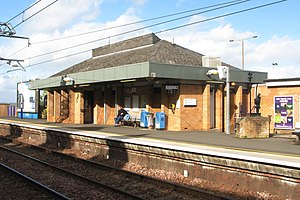Falkirk High railway station
 | |||||
| General information | |||||
| Location | Falkirk, Falkirk Scotland | ||||
| Coordinates | 55°59′30″N 3°47′33″W / 55.9917°N 3.7924°W | ||||
| Grid reference | NS882791 | ||||
| Managed by | ScotRail | ||||
| Platforms | 2 | ||||
| Other information | |||||
| Station code | FKK | ||||
| History | |||||
| Original company | Edinburgh and Glasgow Railway | ||||
| Pre-grouping | North British Railway | ||||
| Post-grouping | London and North Eastern Railway | ||||
| Key dates | |||||
| 21 February 1842 | Opened as Falkirk[2] | ||||
| 1 February 1903 | Renamed as Falkirk High[2][3] | ||||
| Passengers | |||||
| 2018/19 | |||||
| Interchange | | ||||
| 2019/20 | |||||
| Interchange | | ||||
| 2020/21 | |||||
| Interchange | | ||||
| 2021/22 | |||||
| Interchange | | ||||
| 2022/23 | |||||
| Interchange | | ||||
| |||||
Falkirk High railway station is one of two railway stations serving the town of Falkirk in Scotland. It is on the Glasgow to Edinburgh via Falkirk Line and situated on the southern edge of the town, close to the Union Canal.
Falkirk is also served by the railway station at Falkirk Grahamston.
History
[edit]The station was opened as Falkirk with the Edinburgh and Glasgow Railway on 21 February 1842.[2] Edinburgh-bound services initially terminated at Haymarket, but were subsequently extended to the North British Railway's station at Edinburgh Waverley in 1846.[4] The NBR took over operations in 1865 when it absorbed the E&GR, with the London and North Eastern Railway succeeding it at the 1923 Grouping.
In 1903, the station was renamed as Falkirk High recognising it being one of several stations in the town (the others being Falkirk Grahamston and Camelon on the Polmont to Larbert/Greenhill loop line) and its location above the town.[3]
Services
[edit]Falkirk High station is open (and staffed) seven days per week; at off-peak times eight trains per hour stop, four for Glasgow via Croy and four for Edinburgh via Polmont and Linlithgow. This drops to every half-hour each way in the evenings.
Journey times to Edinburgh vary from 27 minutes to 38 minutes depending on stopping stations and time of day; to Glasgow the journey time is between 18 and 26 minutes.
On Sundays there is a half-hourly service in each direction.[5]
Train services are provided by ScotRail.
| Preceding station | Following station | |||
|---|---|---|---|---|
| Polmont | ScotRail Glasgow to Edinburgh via Falkirk Line |
Croy | ||
| Historical railways | ||||
| Polmont Line and station open |
North British Railway Edinburgh and Glasgow Railway |
Bonnybridge High Line open, station closed | ||
Statue
[edit]Falkirk High station is home to the metal sculpture of "Antonine the Legendary Engine" by George Wyllie. This sculpture is of sufficient importance to be listed and protected by the Railway Heritage Committee.[6]
References
[edit]Notes
[edit]- ^ Brailsford 2017, Gaelic/English Station Index.
- ^ a b c Butt (1995), p. 93
- ^ a b Butt (1995), p. 94
- ^ and Glasgow Railway Railscot Chronology - Edinburgh & Glasgow Railway Archived 2 February 2014 at the Wayback Machine Railscot; Retrieved 2014-01-29
- ^ GB National Rail Timetable May 2016 Edition, Table 228
- ^ "Railway Heritage Committee List of Designations, Undertakings, and Disposals (as at 12th August 2011)". Archived from the original on 4 October 2012. Retrieved 25 September 2011.
Sources
[edit]- Brailsford, Martyn, ed. (December 2017) [1987]. Railway Track Diagrams 1: Scotland & Isle of Man (6th ed.). Frome: Trackmaps. ISBN 978-0-9549866-9-8.
- Butt, R. V. J. (October 1995). The Directory of Railway Stations: details every public and private passenger station, halt, platform and stopping place, past and present (1st ed.). Sparkford: Patrick Stephens Ltd. ISBN 978-1-85260-508-7. OCLC 60251199. OL 11956311M.
- Jowett, Alan (March 1989). Jowett's Railway Atlas of Great Britain and Ireland: From Pre-Grouping to the Present Day (1st ed.). Sparkford: Patrick Stephens Ltd. ISBN 978-1-85260-086-0. OCLC 22311137.
